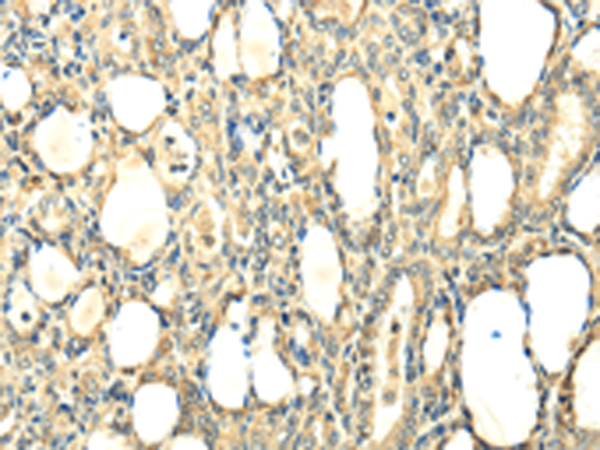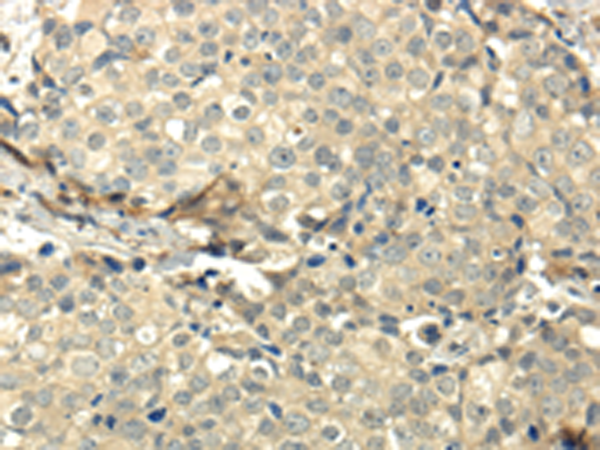

| WB | 咨询技术 | Human,Mouse,Rat |
| IF | 咨询技术 | Human,Mouse,Rat |
| IHC | 1/25-1/100 | Human,Mouse,Rat |
| ICC | 技术咨询 | Human,Mouse,Rat |
| FCM | 咨询技术 | Human,Mouse,Rat |
| Elisa | 1/2000-1/5000 | Human,Mouse,Rat |
| Aliases | TECK; Ckb15; SCYA25 |
| Host/Isotype | Rabbit IgG |
| Antibody Type | Primary antibody |
| Storage | Store at 4°C short term. Aliquot and store at -20°C long term. Avoid freeze/thaw cycles. |
| Species Reactivity | Human |
| Immunogen | Fusion protein of human CCL25 |
| Formulation | Purified antibody in PBS with 0.05% sodium azide and 50% glycerol. |
+ +
以下是关于CCL25抗体的3篇参考文献示例,包含文献名称、作者及简要摘要内容:
---
1. **"CCL25/CCR9 interactions regulate intestinal immunity and homeostasis"**
**Authors**: Mora JR, et al.
**摘要**:研究通过使用抗CCL25抗体阻断趋化因子CCL25与其受体CCR9的相互作用,揭示了该信号轴在肠道归巢T细胞的迁移及黏膜免疫调节中的关键作用,为炎症性肠病治疗提供了潜在靶点。
2. **"CCL25 enhances breast cancer cell motility via CCR9-mediated signaling pathways"**
**Authors**: Johnson-Holiday C, et al.
**摘要**:通过体外实验和动物模型,研究发现CCL25通过激活CCR9受体促进乳腺癌细胞侵袭;使用中和性CCL25抗体可显著抑制癌细胞迁移,提示其作为抗肿瘤治疗的潜在策略。
3. **"Targeting CCL25 in a murine model of colitis"**
**Authors**: Wurbel MA, et al.
**摘要**:在小鼠结肠炎模型中,抗CCL25抗体治疗减轻了肠道炎症并改善病理损伤,表明CCL25在介导肠道免疫细胞异常募集中的重要性,为临床干预提供了实验依据。
---
*注:上述文献为示例性内容,实际引用需以具体发表的论文为准。建议通过PubMed或Web of Science等数据库,以关键词“CCL25 antibody”或“CCL25 blockade”检索最新研究。*
CCL25. also known as thymus-expressed chemokine (TECK), is a small chemotactic cytokine belonging to the CC chemokine subfamily. It is primarily produced by thymic dendritic cells and intestinal epithelial cells, playing a crucial role in immune cell trafficking and tissue-specific immunity. CCL25 selectively binds to the CCR9 receptor, which is prominently expressed on immune cells like T lymphocytes, dendritic cells, and gut-homing leukocytes. This ligand-receptor interaction is essential for directing immune cell migration to the thymus and gastrointestinal tract, influencing T-cell development, mucosal immunity, and inflammatory responses.
CCL25 antibodies are vital research tools for detecting and modulating CCL25 activity in experimental settings. They enable the study of CCL25 expression patterns in diseases such as inflammatory bowel disease (IBD), celiac disease, and colorectal cancer, where dysregulated CCL25/CCR9 signaling is implicated. In therapeutic contexts, neutralizing CCL25 antibodies are explored for their potential to inhibit pathogenic immune cell infiltration in autoimmune disorders or block cancer metastasis driven by CCR9-expressing tumor cells. These antibodies are widely used in techniques like flow cytometry, immunohistochemistry, and functional assays to dissect CCL25's role in immune regulation and tissue homeostasis. The development of CCL25-targeted therapies highlights its significance as a biomarker and intervention point in mucosal immunity and cancer research.
×